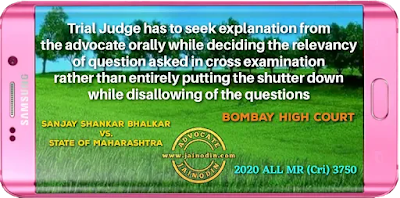Decision of this Court in Yeshpal Jashbhai Parikh v/s. Rasiklal Umedchand Parikh, reported in 1954 SCC OnLine Bom 145 : (1955) 57 Bom LR 282, is also relevant on the point involved in the petition. Note of certain earlier decisions right from Privy Council were taken. In Vassiliades v/s. Vassiliades, reported in [1945] AIR PC 38 it was observed that ;
"No doubtcross-examination is one of the most important processes for the elucidation of the facts of a case and all reasonable latitude should be allowed, but the Judge has always a discretion as to how far it may go or how long it may continue. A fair and reasonable exercise of his discretion by the Judge will not generally be questioned".[Para No.14]
In Yeshpal's case (Supra) it has been observed that, "While Courts will not ordinarily interfer with the proper exercise of the right of cross-examination the Courts have the power and authority to control the cross-examination of a witness".
This Court is not agreeing with the submission by learned Advocate for petitioners that, the Court cannot control the cross-examination or he has free hand at the time of cross-examining the witness of the prosecution; but then agree to the submission that the cross- examination need not be restricted to what the witness has stated in his examination-in-chief. A balance has to be struck here while issuing directions to the learned Additional Sessions Judge that he has to decide the relevancy of the question which he may get explained from the learned advocate for the accused orally and then allow him to put the said question to the witness. On any count learned Additional Sessions Judge will not be justified in entirely putting the shutter down while disallowing of the questions and asking the defence advocate to restrict himself while cross- examining P.W.18 to the post mortem examination report Exhibit 216, sketch Exhibit 217 and certificate Exhibit 218. It is, therefore, again clarified that neither the learned advocate for the accused has unfettered right to put any question to the witness in the cross- examination but at the same time the learned Additional Sessions Judge shall also not restrict him in putting questions in the cross to the above referred documents only. There might be certain questions which would be beyond those documents and as an expert they are required to be elucidated from him. No straight jacket formula can be laid down as to what should be permitted and what should not be permitted as it depend upon the question that would be put and the relevancy and admissibility of the same and / or of the admissibility will have to be decided at that time. Definitely the learned Additional Sessions Judge is guided by the procedure laid down in Bipin Panchal's case (Supra), and it is specifically laid down that, it may be advantages for the Appellate Court in future. He has to bear those advantages which have been laid down in para No.15 of the case, in mind while recording the evidence.[Para No.15]
2020 ALL MR (Cri) 3750

